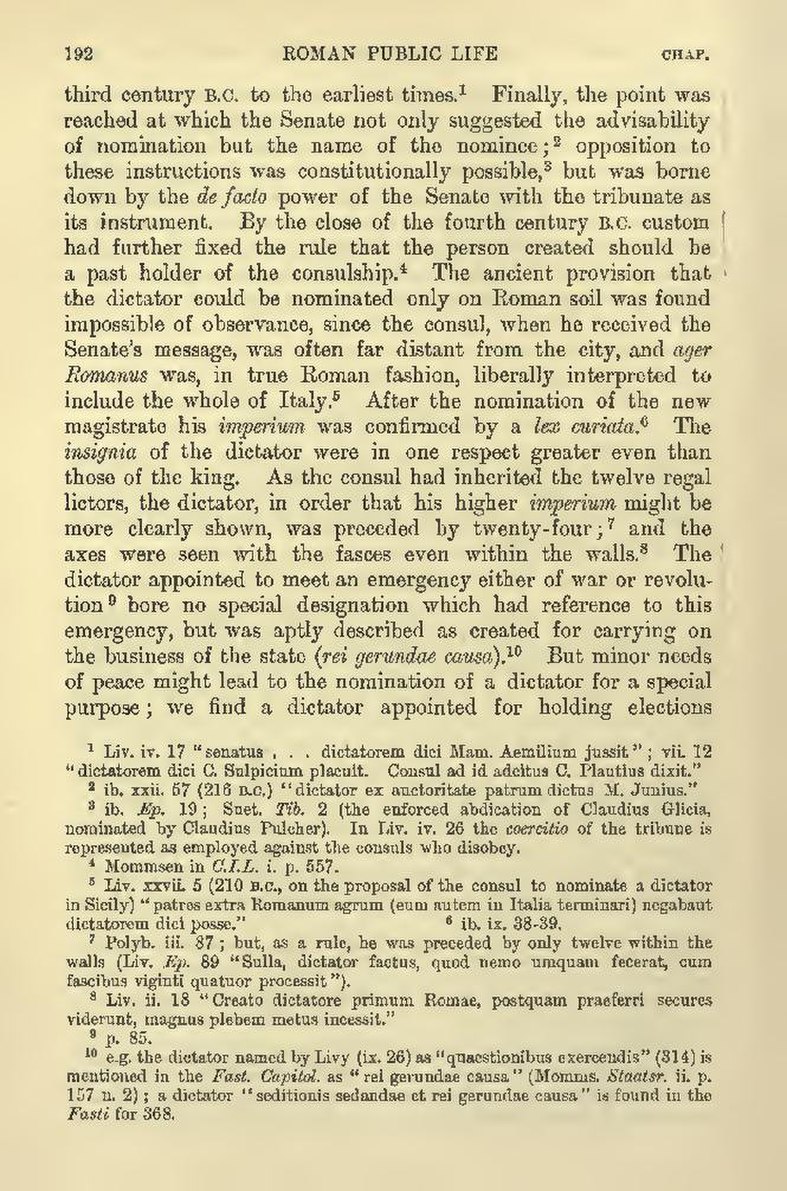third century B.C. to the earliest times.[1] Finally, the point was reached at which the Senate not only suggested the advisability of nomination but the name of the nominee;[2] opposition to these instructions was constitutionally possible,[3] but was borne down by the de facto power of the Senate with the tribunate as its instrument. By the close of the fourth century B.C. custom had further fixed the rule that the person created should be a past holder of the consulship.[4] The ancient provision that the dictator could be nominated only on Roman soil was found impossible of observance, since the consul, when he received the Senate's message, was often far distant from the city, and ager Romanus was, in true Roman fashion, liberally interpreted to include the whole of Italy.[5] After the nomination of the new magistrate his imperium was confirmed by a lex curiata.[6] The insignia of the dictator were in one respect greater even than those of the king. As the consul had inherited the twelve regal lictors, the dictator, in order that his higher imperium might be more clearly shown, was preceded by twenty-four;[7] and the axes were seen with the fasces even within the walls.[8] The dictator appointed to meet an emergency either of war or revolution[9] bore no special designation which had reference to this emergency, but was aptly described as created for carrying on the business of the state (rei gerundae causa).[10] But minor needs of peace might lead to the nomination of a dictator for a special purpose; we find a dictator appointed for holding elections
- ↑ Liv. iv. 17 "senatus . . . dictatorem dici Mam. Aemilium jussit"; vii. 12 "dictatorem dici C. Sulpicium placuit. Consul ad id adcitus C. Plautius dixit."
- ↑ ib. xxii. 57 (216 B.C.) "dictator ex auctoritate patrum dictus M. Junius."
- ↑ ib. Ep. 19; Suet. Tib. 2 (the enforced abdication of Claudius Glicia, nominated by Claudius Pulcher). In Liv. iv. 26 the coercitio of the tribune is represented as employed against the consuls who disobey.
- ↑ Mommsen in C.I.L. i. p. 557.
- ↑ Liv. xxvii 5 (210 B.C., on the proposal of the consul to nominate a dictator in Sicily) "patres extra Romanum agrum (eum autem in Italia terminari) negabant dictatorem dici posse."
- ↑ ib. ix. 38-39.
- ↑ Polyb. iii. 87; but, as a rule, he was preceded by only twelve within the walls (Liv. Ep. 89 "Sulla, dictator factus, quod nemo umquam fecerat, cum fascibus viginti quatuor processit").
- ↑ Liv. ii. 18 "Creato dictatore primum Romae, postquam praeferri secures viderunt, magnus plebem metus incessit."
- ↑ p. 85.
